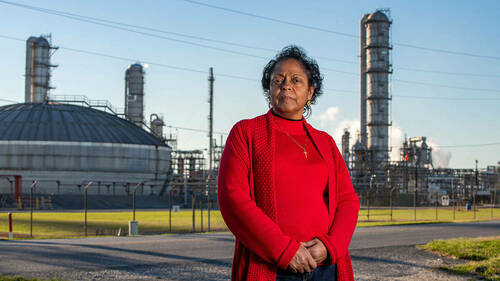
Sharon Lavigne, an environmental justice activist, will receive the University of Notre Dame’s 2022 Laetare Medal — the oldest and most prestigious honor given to American Catholics — at Notre Dame’s 177th University Commencement Ceremony on May 15 (Sunday).
Lavigne is the founder and director of Rise St. James — a faith-based grassroots organization fighting for environmental justice in St. James Parish, Louisiana. A retired special education teacher, she has lived her entire life in St. James Parish and has watched the region transform from idyllic farmland into an embattled community living in the shadow of the petrochemical industry and plagued by industrial pollution.
“Through her tireless activism, Sharon Lavigne has heeded God’s call to advocate for the health of her community and the planet — and to help put an end to environmental degradation which so often disproportionately victimizes communities of color,” said Notre Dame President Rev. John I. Jenkins, C.S.C. “In awarding her the Laetare Medal, Notre Dame recognizes her leadership and her courage as a champion of the environment, a voice for the marginalized and a steadfast servant of our creator.”
Located between Baton Rouge and New Orleans, St. James Parish is in the midst of an area nicknamed Cancer Alley, an 85-mile stretch of land along the Mississippi River that has more than 150 petrochemical plants and refineries. Thirty-two of those plants are in St. James Parish alone and are highly concentrated in districts in which the majority of residents are both Black and lower income.
Even though cancer rates in the region are already up to 700 times that of the rest of the United States, corporations continue to seek to build and expand facilities there.
“The Civil Rights Act and the Louisiana Constitution are supposed to protect Black communities from this type of environmental racism. They have not in Cancer Alley,” Lavigne said. “Our agencies are rubber stamping every permit that comes across their desks.”
Although Lavigne never envisioned herself as an activist, she was inspired to create Rise St. James in 2018 when a plastics corporation received the greenlight to build another plant in St. James Parish — two miles from her home. At the time, many in her community believed that fighting against the proposed multibillion-dollar manufacturing facility was a lost cause.
“Why would they put the plant over here? Because they knew that people weren’t going to speak up,” Lavigne said. “And they were right. The people weren’t going to speak up. That’s when God touched me and told me to fight — and that’s what I did.”
Lavigne and the members of Rise St. James successfully campaigned against the construction of a plant proposed by Wanhua Chemical, organizing marches, speaking out at town hall and parish council meetings, partnering with other environmental justice organizations and producing signs, ads and reports on the negative health and environmental impact of the industry’s pollutants. In September 2019, Wanhua withdrew its land use application.
The group is currently working to stop construction of a $9.4 billion chemical plant, proposed by Formosa Plastics.
While Lavigne is attentive to the economic realities at play — and remembers the first plants being celebrated as an economic boon for the area — she asserts that her community should not have to sacrifice lives for their livelihood.
“When the first plant came in in the late 1960s, everybody welcomed it. We thought it was something nice coming to our little town,” she said. “Then more and more started to come. But we didn’t know those plants were going to poison us.
“What good are jobs if they spread cancer all over St. James Parish?”
For her efforts, Lavigne received the Goldman Environmental Prize in 2021 and has been named to the Forbes “50 over 50” impact list. She spoke at the Congressional Convening on Environmental Justice in Washington, D.C., in 2019 and welcomed Environmental Protection Agency Administrator Michael Regan to St. James Parish last year.
A lifelong member of St. James Catholic Church, Lavigne said that her faith has buoyed her throughout her journey — and that her advocacy work has brought her closer to God.
“I know he has me here for a reason, so I want to do his will,” Lavigne said. “I want to do the work that he wants me to do. He put a fight in me that I can’t even explain. I’ve gotten closer to him. And I’m so glad I’m closer to him because now we can fight anything.”
The Laetare (pronounced lay-TAH-ray) Medal is so named because its recipient is announced each year in celebration of Laetare Sunday, the fourth Sunday in Lent on the Church calendar. “Laetare,” the Latin word for “rejoice,” is the first word in the entrance antiphon of the Mass that Sunday, which ritually anticipates the celebration of Easter. The medal bears the Latin inscription, “Magna est veritas et praevalebit” (“Truth is mighty, and it shall prevail”).
Established at Notre Dame in 1883, the Laetare Medal was conceived as an American counterpart of the Golden Rose, a papal honor that antedates the 11th century. The medal has been awarded annually at Notre Dame to a Catholic “whose genius has ennobled the arts and sciences, illustrated the ideals of the Church and enriched the heritage of humanity.”
Previous recipients of the Laetare Medal include Civil War Gen. William Rosecrans, operatic tenor John McCormack, President John F. Kennedy, Catholic Worker founder Dorothy Day, novelist Walker Percy, Vice President Joe Biden, Speaker of the House John Boehner, Cardinal Joseph Bernardin, labor activist Monsignor George G. Higgins, jazz composer Dave Brubeck, singer Aaron Neville and actor Martin Sheen.